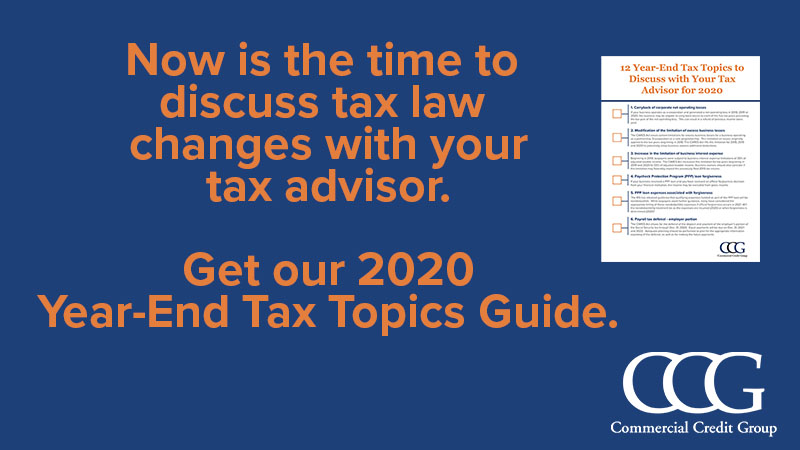Recently Julie Murphy, our VP of Marketing, talked with tax professionals from Dixon Hughes Goodman LLP to get their take on some of the most important topics to discuss with your tax advisor, for tax year 2020. What follows are some key bullet points. Additional details can be found an article we wrote for Waste Advantage magazine.
Please note, the information conveyed herein is meant to be informative and should not be construed as specific tax advice. Consult your tax advisor to discuss your particular needs.
There have been a number of changes to tax laws, many brought about by COVID-19, specifically the Coronavirus Aid, Relief and Economic Security (CARES) Act. Most of these changes affect the 2020 tax year and some have implications for tax years 2018 and 2019 as well. Here is a brief list of some of the items you may want to discuss with your tax advisor before the year ends.
The CARES Act and related legislation present several items to consider.
- Carryback of corporate net operating losses
- Modification of the limitation of excess business losses
- Increase in the limitation of business interest expense
- Paycheck Protection Program (PPP) loan forgiveness
- PPP loan expenses associated with forgiveness
- Payroll tax deferral--employer portion
- Payroll tax deferral--employee portion1
1Pursuant to President Trump’s Executive Order, Deferring Payroll Tax Obligations in Light of the Ongoing COVID-19 Disaster
The following did not originate through COVID-19 legislation but offer important reminders for business owners to assist with tax planning.
- New or used equipment purchases – Section 179 and Bonus Depreciation
- Estimated tax payments
- Independent contractor information reporting—Form 1099-NEC
- Uncollectible bad debts
- Idle equipment depreciation
Not all of the topics above apply to every business and situation, but your tax advisor can direct you accordingly.
This information is not meant as specific tax advice or recommendations but rather to be used to promote an informed conversation with your tax advisor as you approach year end.
About the Authors:
Julie Murphy, MBA, VP – Marketing, Commercial Credit Group Inc.
Julie has nearly 30 years of experience in marketing, currently in financial services where she helps companies with their equipment financing challenges. As the daughter of a federally authorized tax preparer (Enrolled Agent) Julie understands the need for companies to be well-informed on tax and other financial matters.
David Henderson, CPA, Tax Partner, Dixon Hughes Goodman LLP
David has more than 20 years of tax and accounting experience, and he leads the tax practice for DHG Financial Services. David has extensive knowledge in accounting for income taxes, income tax transformation, regulatory capital requirements for financial institutions, state and local tax optimization, affordable housing and renewable energy tax credits and tax controversy.
Wesley Allen, CPA, CMA, CFE, Managing Director, Dixon Hughes Goodman LLP
Wesley has more than 16 years of public accounting experience, all of which have been spent with DHG. His experience includes working with financial institutions in the areas of process and control evaluation, external financial reporting to regulatory agencies and investors, financial statement audits, Sarbanes-Oxley compliance, control evaluation, mergers/acquisitions and SEC reporting.
David and Wesley previously provided insight for CCG customers into the tax changes brought about by the Tax Cuts and Jobs Act (TCJA). You can learn more about the TCJA by reading these articles:






















